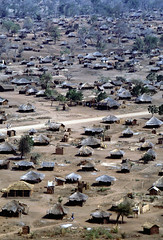 Image by daveblume via Flickr
Image by daveblume via Flickr
Contrary to popular opinion, it is the world's poorest nations who provide sanctuary for the most refugees
Contary to the impression given by media, 80% of refugees seek asylum in the world's poorest nations, putting an incredible burden on countries already struggling to care for their citizens. Most refugees and migrants escape their country of origin and land in a similarly unstable or poverty-stricken neighbour state.
It is a comparatively small number who traverse the Strait of Gibraltar from Morocco to mainland Spain or hop the layers of electric fence guarding the tiny Spanish exclaves of Ceuta and Melilla. Some find other ways to sneak into fairy-tale Europe, smuggled from the North African coast by boat to Italy.
The world's wealthy nations are not doing enough; the burden is been carried by poorer, less stable countries. The UK currently hosts 300,000 refugees. Syria and Iran host the refugee populations of near 1 million each while Pakistan is home to the largest number of foreign refugees, 1.8m. Aside from the financial cost, the sheer volume of refugees risks destabalising Pakistan's already fragile political system. Pakistan has already seen enormous internal displacement, as this year, 2m have fled their homes.
At the end of 2008, the UN high commission for refugees (UNHCR) counted 42m people uprooted globally. Of those, 16m are seeking asylum in another country, while 26m are displaced within the borders of their own state.
In most receiving countries, rich and poor alike, the attitude toward those fleeing from persecution remains sceptical, if not xenophobic. There will always be those who abuse the system, who fabricate or exaggerate threats for the opportunity to earn a coveted, European minimum wage, but millions more are fleeing real danger.
The organisers of Refugee Week, which ends on Sunday, hope to encourage a better understanding between communities and to celebrate the contribution refugees make to the country. The UNHCR's World Refugee Day, celebrated tomorrow (June 20), hosts similar events across the world in an effort to educate host populations about refugees and dissolve the stereotypes and stigma attached to the title.
Claiming asylum is not easy. Applicants often endure intense and invasive questioning to prove they meet the UNHCR's strict criteria and are not just economic migrants. Thousands of claims are rejected; in 2007, the UK dismissed 72%[pdf] of the 14,935 asylum appeals made that year.
This decade has seen one of the largest population movements ever; almost 5 million Iraqis fled their homes during the violence following the American-led invasion and occupation. Nearly 2 million are seeking asylum in another state while 2.8m remain displaced within Iraq's borders. Some of these refugees cannot return home because their work with coalition forces in Iraq has made them a target. This should qualify them for resettlement to the US and UK, but only a fraction have actually succeeded as few are able to meet the rigid application requirements.
The goal for asylum seekers is a durable solution. In some cases, refugees return home but for the majority that is not an option and life in the poor nations that host them is usually miserable. In 2008, the UNHCR resettled just 67,000 refugees to third countries while governments reported taking another 20,000 without UNHCR assistance. The US took over 60,000 of those leaving fewer than 30,000 refugees sprinkled over the rest of the world's wealthy states.
The global refugee crisis is unlikely to subside, as those who are resettled and repatriated are quickly replaced by others fleeing new conflicts and searching, sometimes literally, for higher ground as environmental crises make their homelands unlivable.
Inhabitants on the Carteret Islands, north east Papua New Guinea, are starting to evacuate as the rising sea level threatens to engulf their atoll. The islanders aren't the first to flee environmental conditions—people have always migrated because of drought, flood or scarcity of resources. They do, however, illustrate how actions afar can impact others. Climate change, fuelled by global consumption, is actually swallowing their land. Inhabitants of larger neighboring islands don't want them. With so few refugees being resettled, the situation for inhabitants of the Carterets, and for millions of other uprooted people, remains bleak.
Source

![Reblog this post [with Zemanta]](http://img.zemanta.com/reblog_e.png?x-id=ccdd55f6-834a-4fdb-9e67-78f0266e9fc1)






 Join our page
Join our page


0 comments:
Post a Comment